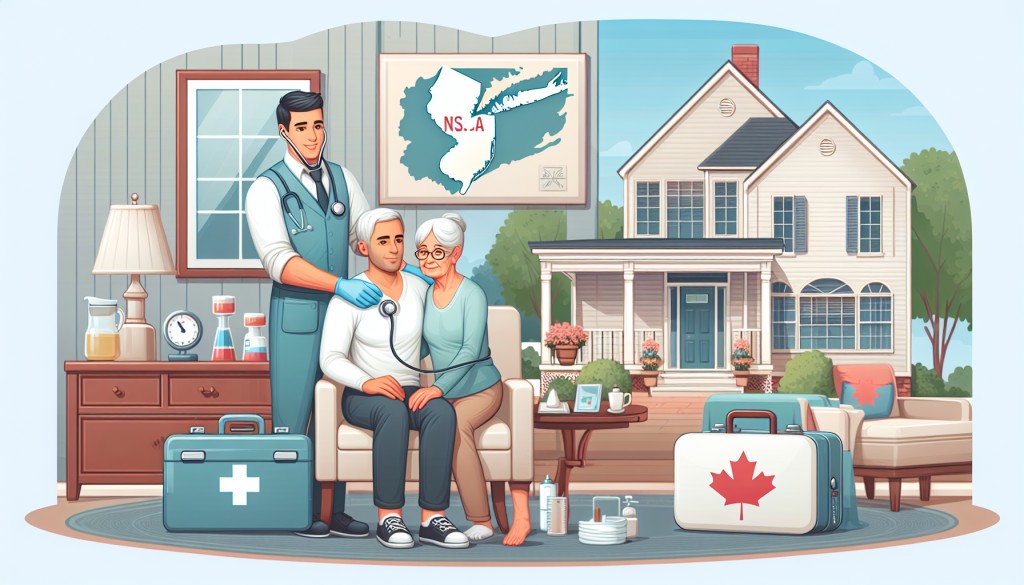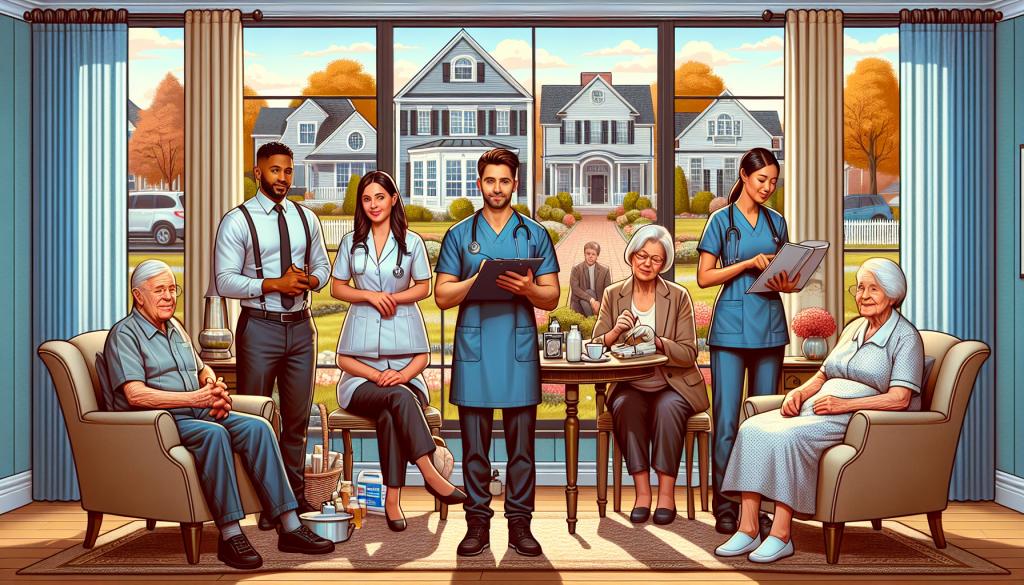Confirm Licensing, Certification, and Top Quality Ratings
Before you authorize with any type of home doctor in 2025, treat licensing, accreditation, and quality ratings as non‑negotiables. 2025 Home Health Apps and Devices to Watch . Begin with the fundamentals: validate the agency is appropriately licensed in your state for the precise services you require. "Home health and wellness" (proficient nursing, treatment, injury treatment) is managed differently from "home treatment" or "personal treatment" (showering, dressing, companionship). Use your state health department or expert licensing board's online database to verify the company certificate is energetic and in great standing, which it covers the appropriate solution category. If the company will certainly bill Medicare, confirm it is Medicare‑certified; you can cross‑check this on Medicare's Treatment Compare site.
Certification isn't the same as a permit, however it indicates the company has actually satisfied higher requirements and undergoes regular outside evaluation. Search for appreciated certifying bodies such as The Joint Commission, LAD, or ACHC. Request an existing accreditation certificate and the date of the last survey. For non‑medical home treatment, certification is voluntary; if an agency isn't approved, they need to have the ability to explain exactly how they maintain top quality and oversight in its lack.
Do a deeper credential look at individuals who will be in your home. Registered nurses, licensed nurses, physical and physical therapists, and social workers all have specific licenses you can validate with state boards. Home health and wellness assistants ought to fulfill state training needs. It's affordable to ask the firm to validate that all personnel have passed history checks, are not on the federal OIG Exclusions Detail, and bring suitable specialist obligation and workers' compensation protection. Demand evidence of the firm's general liability insurance; lots of families additionally request a certificate of insurance upon contracting.
Usage objective quality scores to contrast companies, not simply endorsements. On Medicare Care Contrast, evaluate the celebrity ratings and go into details measures like timely initiation of care, rehospitalization prices, enhancement in mobility and self‑care, and client experience scores from HHCAHPS surveys. In 2025, Home Wellness Value‑Based Buying uses nationwide, so ask the firm to share its most recent efficiency or result reports and what it is doing to enhance. For Medicaid home- and community‑based services, examine your state's carrier directory site for high quality signs, essential incident records, and EVV (electronic browse through verification) compliance information. On-line testimonials can be insightful but need to not override formal quality data and regulatory documents.
Request openness. Ask the firm for its newest state study outcomes and strategy of correction, any type of CMS assents or charges, and just how problems are taken care of. In an era of telehealth and remote tracking, inquire about tool safety and security and privacy practices, HIPAA compliance, and whether any kind of electronic tools they utilize are FDA‑cleared where relevant. If the company asserts healthcare facility or doctor collaborations, validate exactly how they share information, especially if they integrate with your clinician's document system.
Red flags include incredibly elusive solutions concerning licensing or study background, ended accreditation, missing out on proof of insurance policy, uncommonly high staff turn over without description, or top quality scores well below local standards. A trusted carrier will certainly invite these concerns, offer paperwork promptly, and aid you translate rankings in the context of your requirements. Confirming qualifications and top quality up front requires time, but it is the most trusted way to secure safe, reliable treatment in the house.

Evaluate Telehealth, Remote Surveillance, and Information Safety and security
Analyze Telehealth, Remote Tracking, and Data Protection
In 2025, selecting a home doctor indicates looking beyond bedside skills to the electronic foundation that supports your treatment. Telehealth, remote patient tracking, and information protection currently identify just how convenient, secure, and connected your care will be.
Begin with telehealth. Video brows through ought to feel as reputable as an office appointment. Ask how very easy it is to routine, whether you can see the exact same clinician for continuity, and what takes place if the connection goes down. Look for features like e-prescribing, secure messaging, after-visit summaries, and language accessibility such as interpreters or inscriptions. Validate the platform deals with your gadgets, supports availability demands, and uses technology assistance for elders or caretakers. Just as essential is assimilation: does the telehealth platform speak to your existing medical records so your primary care clinician sees updates? If treatment crosses state lines, verify licensure and whether your insurer covers the solutions you prepare to use.
Remote tracking can change day-to-day live for people handling chronic problems, recouping after surgical treatment, or requiring safety checks. Focus on medical value and operational integrity. Which conditions do they keep track of and with what devices? Are the tools FDA-cleared and confirmed for home usage? That views the information, exactly how usually, and what are the response times for unusual analyses at night or on weekends? Ask how alert thresholds are readied to restrict false alarms and how frequently those thresholds are reviewed. Examine whether tools are lent or acquired, that handles arrangement, training, and substitute, and what mobile or Wi‑Fi connection is needed. Interoperability still matters below also: will your data circulation right into your wellness document, and can you see it in an individual application?

Data protection should never be an afterthought. A company's case of "HIPAA compliant" is a standard, not a differentiator. Search for independent audits or qualifications (as an example, SOC 2 Kind II, HITRUST, or ISO 27001), security of information in transit and at remainder, multi-factor authentication, and role-based accessibility with audit logs. Inquire about event feedback and breach alert treatments, just how commonly they run protection drills, and their technique to ransomware resilience and back-ups. For home tools, confirm that data is encrypted on the device and during transmission, software application is maintained to day, and lost or stolen devices can be from another location cleaned. Clarify that possesses your information, how much time it's preserved, just how to ask for deletion, and whether de-identified information is utilized for analytics or shown 3rd parties. Ensure a Business Affiliate Contract exists between the technology suppliers and the care company, which frontline staff are trained in personal privacy methods, including getting consent for any recording.
Lastly, consider the human side of the technology. Will they assist set up your Wi‑Fi or offer cellular packages if you don't have broadband? Do they use clear instructions, large-print materials, multilingual assistance, and caregiver training? Exists 24/7 technology support and a basic method to escalate medical issues?
In a market crowded with applications and tools, the very best home health care solutions in 2025 mix top quality professional treatment with trustworthy digital accessibility, workable surveillance, and strenuous security of your info. Select the team that discusses their modern technology clearly, verifies their safeguards, and makes it simple for you and your family members to use.
Examine Treatment Plans, Staffing, and Caregiver Fit
Picking home healthcare in 2025 ways looking past a shiny sales brochure. The appropriate companion will reveal you a clear treatment plan, trustworthy staffing, and a caregiver that genuinely fits your liked one's requirements and personality. Start with the treatment plan. Ask how the firm examines demands and collections objectives: not just identifies, however useful abilities, drugs, drop threat, cognitive assistance, nourishment, loneliness, transport, and caretaker reprieve. A solid plan is written by or under the guidance of a registered nurse or specialist, with quantifiable results (for example, less drops, enhanced mobility, medicine adherence) and a schedule for evaluation-- typically every 30 to 60 days or after any kind of change in problem. In 2025, several agencies utilize remote person surveillance and telehealth; see to it the plan explains what gadgets are made use of, that examines the information, and exactly how information is shown to your physician. Interoperability and personal privacy issue-- ask whether their systems link to your physician's digital documents, how data is safeguarded, and that can see updates.

Staffing is where promises meet fact. Clear up whether caregivers are W‑2 workers or 1099 contractors; employees commonly have stronger oversight, training, and insurance protection. Validate credentials (CNA, HHA, LVN/LPN, RN), history checks, driving records if transport is included, booster shots, CPR, and any type of specialty training like dementia or Parkinson's care. Request their turn over rate, typical caregiver period, and fill rate for shifts-- numbers that expose stability. Continuity is essential: will you have a key caregiver with a little back-up pool, or see frequent rotations? What is the backup prepare for sick days, no-shows, tornados, or public health and wellness notifies? In a limited labor market, companies that pay fairly and supply advantages have a tendency to keep staff better-- do not think twice to ask just how they support caretaker well‑being and avoid exhaustion.
Caretaker fit surpasses availability. Share honest details regarding routines, language preferences, cultural or spiritual methods, animal convenience, smoking cigarettes level of sensitivities, songs or food preferences, and character style. An excellent agency will use organized matching-- skills, language, cultural expertise, sex preference, driving ability, and physical capacity for transfers or tools-- to suggest a caretaker and set up a meet‑and‑greet. Many will certainly allow you attempt a short trial change prior to devoting. Observe chemistry: Does the caregiver listen, make eye contact, and ask thoughtful inquiries? Do they appreciate limits while being positive? If your enjoyed one has mental deterioration, search for perseverance, redirection abilities, and a calm, assuring visibility.
Communication ought to be easy and constant. Ask to see the household portal or app if one exists: Can you watch browse through notes, jobs completed, vitals, and messages? How rapidly does the office respond, and what is the rise course after hours? Who is your named treatment supervisor, and exactly how commonly will they go to face to face to supervise treatment? In 2025, lots of states need electronic browse through verification-- validate that clock‑in/ out protects you from invoicing for missed out on time, and that your data is not utilized for anything else without approval.
Quality and responsibility are nonnegotiable. Search for accreditation (Joint Commission, LAD, or ACHC) and state licensure. Ask about customer fulfillment scores, complaint resolution time, case prices (drops, hospitalizations), and any value‑based programs they participate in. Request 2 current customer recommendations with comparable needs. Evaluation contract information carefully: minimal hours, termination terms, substitute assurances, and what happens if the caregiver isn't a fit. If you're using Medicare for skilled home wellness, clarify what is covered and for the length of time; for exclusive obligation treatment, inquire about long‑term care insurance coverage, Medicaid waivers, VA benefits, and whether the firm can assist with paperwork.
Practical security concerns complete the picture. How do they analyze the home for dangers and advise equipment? Do they educate caretakers on secure transfers and infection control? What is the policy on cameras in the home? If the caregiver will drive your enjoyed one, validate insurance policy coverage and vehicle standards.
Warning consist of obscure or cookie‑cutter care strategies, no registered nurse oversight, high turn over, constant last‑minute routine changes, reluctance to share result data, aggressive sales techniques, or resistance to a meet‑and‑greet. Green lights include clear reporting, foreseeable staffing with back-ups, respectful matching, and a clear plan for constant enhancement.
In the long run, the ideal choice feels both professional and individual. You need to see a plan you can understand, a team you can reach, and a caregiver your loved one eagerly anticipates seeing. If any kind of item doesn't really feel right, keep looking-- fit, in home treatment, is every little thing.
Compare Prices, Insurance Coverage Coverage, and Contract Terms
Comparing pricing, insurance coverage, and agreement terms is where most family members either save thousands-- or encounter undesirable surprises-- when selecting home medical care solutions in 2025. Treat this like you would certainly any significant purchase: need clarity, confirm benefits in creating, and read the small print with a tranquility, cynical eye.
Begin with prices. Ask each company for an itemized quote that matches your real care strategy: variety of hours each week, level of caretaker (aide vs. LPN/RN), and any type of specialized demands such as dementia care, injury care, or post-surgical support. In 2025 you'll see several models-- hourly prices, visit-based charges, live-in prices, and packed "hybrid" plans combining in-person treatment with telehealth and remote tracking. Compare apples to apples by consisting of add-ons: minimum-hour needs, overtime limits, weekend break and vacation costs, traveling or vehicle parking costs, registered nurse guidance or treatment administration fees, technology or gadget service, and fees for immediate scheduling. Ask how usually rates can change, whether there's a price-lock period, and if boosts are linked to a set percentage or an index. Clarify what occurs when the care strategy adjustments mid-month: do they pro-rate or re-quote? If you're considering a computer registry instead of a full-service company, factor in your duty for payroll tax obligations, employees' compensation, and responsibility-- what looks less costly upfront can cost much more in risk and administration.
Next off, determine insurance policy coverage. Know the distinction between clinical home health and wellness (knowledgeable nursing, therapy, usually covered if clinically necessary) and non-medical home care (aid with showering, dishes, and friendship, often not covered by typical medical insurance). For Medicare: knowledgeable home health can be covered when qualification requirements are fulfilled, yet individual treatment is normally not, unless folded into a plan of care. Medicare Advantage prepares significantly use supplementary at home support, dish distribution, or remote surveillance-- advantages vary commonly by strategy, need in-network companies, and might require prior consent or recertification, so verify restrictions, copays, and see caps before you begin. Medicaid advantages and Home- and Community-Based Solutions waivers can be generous yet differ by state and managed treatment plan; waitlists and supplier networks issue. Long-lasting treatment insurance policy can fund significant hours as soon as benefit triggers are fulfilled (typically requiring aid with 2 or even more tasks of daily living or cognitive problems), however see elimination periods, daily or monthly caps, and lifetime maximums. Veterans might get approved for Help and Participation or Homemaker/Home Health and wellness Aide services via the VA. Ask if the agency will certainly confirm advantages, manage consents, and expense directly, and whether they'll proceed treatment if consents gap. If you plan to self-pay, inquire about price cuts for longer schedules, autopay, or bundled programs. HSAs and FSAs can typically be used for clinically required services; for tax obligation deductions or credit histories, seek advice from a tax specialist.
Currently, the agreement terms-- the part the majority of people skim and later on remorse. Seek:
- Termination and notice: Can you stop briefly or cancel without penalties? Are there minimums or early termination fees?
- Auto-renewal and rate changes: Exactly how are increases communicated and covered?
- Staffing and replacements: Exactly how swiftly do they change a caretaker that's unwell or not a fit? Is there a trial duration or satisfaction guarantee?
- Non-solicitation and buy-out: If you intend to hire a caretaker directly later on, what cost applies?
- Worker condition and insurance: Are caregivers W-2 staff members covered by workers' compensation and obligation insurance? Request evidence.
- Range of technique: What jobs can aides legitimately carry out in your state (medication administration, transfers, catheter care)? That manages and just how usually?
- Documents and openness: Will you have accessibility to digital browse through logs, treatment notes, and reassessments? That updates the treatment plan and exactly how regularly?
- Invoicing cycle and disputes: Down payments, late charges, refunds for extra hours, rounding regulations for change start/stop times, and the process for opposing an expense.
- Security and personal privacy: Event reporting, infection control, history checks, driving plans, and data personal privacy for any kind of remote tracking gadgets.
- Disagreement resolution: Mediation conditions, venue, and your legal rights under state consumer regulations.
Do a simple "true cost" contrast throughout finalists: predicted regular hours x price + all anticipated costs-- verified insurance policy reimbursement. Then layer in non-financial value: responsiveness, back-up insurance coverage, managerial high quality, and outcome monitoring. In 2025, trusted companies can show high quality metrics and may take part in value-based programs-- request for their a hospital stay reduction prices or client contentment scores.
Before finalizing, get every guarantee in writing, including start date, caretaker certifications, and the precise services covered. If the agreement feels thick or discriminatory, have actually a trusted expert or lawyer evaluate it. The most effective offer is not just the most affordable price-- it's the arrangement that delivers risk-free, reliable treatment with foreseeable prices and not a surprises.
